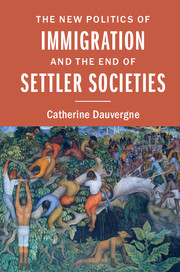Book contents
- Frontmatter
- Contents
- Acknowledgements
- Preface
- 1 Introduction
- 2 Settler societies and the immigration imagination
- PART 1 THE END OF SETTLER SOCIETIES
- PART 2 THE NEW POLITICS
- 6 Why economics and human rights are not enough
- 7 The loss of settlement and society
- 8 The close of the post-colonial
- 9 Contours and consequences of a new politics
- 10 Imagining immigration without a past – stories for the future
- Appendices
- Bibliography
- Index
8 - The close of the post-colonial
from PART 2 - THE NEW POLITICS
Published online by Cambridge University Press: 05 March 2016
- Frontmatter
- Contents
- Acknowledgements
- Preface
- 1 Introduction
- 2 Settler societies and the immigration imagination
- PART 1 THE END OF SETTLER SOCIETIES
- PART 2 THE NEW POLITICS
- 6 Why economics and human rights are not enough
- 7 The loss of settlement and society
- 8 The close of the post-colonial
- 9 Contours and consequences of a new politics
- 10 Imagining immigration without a past – stories for the future
- Appendices
- Bibliography
- Index
Summary
The end of settler societies also reverberates through the European nations that were the source of the original settlers, and of the cultures, laws, and governance systems that were foundational in the settler nations. The new politics of immigration is as prevalent in European states as in the former settler societies themselves. Indeed one of the markers of this politics is its commonality throughout the prosperous Western liberal democracies. The shifting political winds that usher in this new politics arise from changes in both the former settler societies and the former colonial masters. One baseline marker is the transformation of many European states into nations of immigration, in at least a statistical sense. But this alteration is no more than a starting point for understanding the deeper societal and political transformation.
One far-reaching consequence of the end of settler societies is that post-colonial linkages are obscured. This happens in settler states, in colonial masters, and in non-settler former colonies. In the settler states, this obscuring took place when the post-colonial moment was elided and the new nations emerged as fully independent. A final marker of this severing of colonial ties is the end of special immigration and citizenship linkages between the former European powers and the settler societies, the final pieces of which ended as late as the 1990s. The gradual and possibly ineffectual end of the colonial era in the settler societies, discussed in Chapter 2, is not the site of post-colonial politics. Rather, these politics are firmly located in the global South, where European colonization and conquest was never as “effective” as in the settler societies. European colonization of these global South states left a powerful immigration trace, as colonial subjects typically benefited from preferential access to states of their colonial masters. This immigration – for example, of Indians to England, Moroccans to France, and Congolese to Belgium – fueled post-colonialism in myriad ways.
By the early twenty-first century, however, European countries had largely ended their special migration relationships with former colonies and are now moving to shed the overhang of liberal guilt that was embedded in those affiliations. This is a vital step in moving toward a pan-European approach to asylum and to migration. These shifts follow from the “invention” of European citizenship and give tactile meaning to this ideal.
- Type
- Chapter
- Information
- The New Politics of Immigration and the End of Settler Societies , pp. 150 - 173Publisher: Cambridge University PressPrint publication year: 2016



